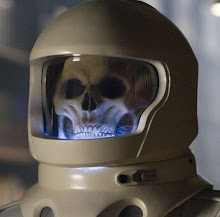Earlier this week I went to go and see The Hunger Games at my local cinema. Since I re-read the first book in the trilogy very recently, both the novel and its big screen adaptation are very fresh in my mind, so I thought it would be as good a time as any to talk about the film.
The story of The Hunger Games is a familiar one; twenty-four children, between the ages of twelve and eighteen, are entered into an annual competition know as the Hunger Games. Stranded in a massive arena, these 'tributes' are forced to battle to the death until only one is left standing. It's a story that's been done many a time before - Gamer and Battle Royale are two popular examples of the death match story structure, while The Running Man and Series Seven are both about ultra-deadly game shows. Suzanne Collins, the author, does inject a little originality into the story by setting it in a dystopian, far-flung vision of North America, circumventing the genre norm of framing the story in a near-future world, but for the most part it's a genre many viewers will have had prior experience with.
One of the most striking things about the film is its style of direction. When we first join Katniss - our protagonist and one of this year's tributes - in her ramshackle, poverty-stricken home of District 12, the camera is all over the place. It sits at jaunty, unnatural angles, rarely stays still, and blurs in and out of focus. In a way, it very much reflects the everpresent chaos of the District. Similarly, once we move to the ordered, civilised world of the Capitol, the jerky camera movements settle down and are replaced with more static, easy-on-the-eye shots. Rather than maintain a consistent style, the film's visuals change based on subjective factors that change from scene to scene, such as location and the events of the story. This is something of a double-edged sword for the film; while it makes certain scenes more dynamic and interesting to watch, it also results in some very sloppy cinematography in places. In particular, some of the District 12 scenes lay the stylistic shots on too thick and too fast, resulting in a few early scenes that are disorientating to the point of spoiling the viewer's enjoyment of them.
Thankfully, the film is very loyal to the source material in terms of story. Obviously some aspects of the story have been removed due to time constraints - the character of Madge, for example, or the Avoxes - but by and large the film follows the novels beat for beat. This means any viewers who have read the book (which, I imagine, is a significant proportion of the film's target audience) will recognise some of the key moments from the novel, and enjoy them all the more because of it. The scene where Katniss sings to Rue, or the final confrontation atop the Cornucopia; here the film manages to one-up the Harry Potter series, which deviates far too frequently from the books, and loses some of that impact of recognition as a result.
In terms of acting, most of the film's cast performs admirably. Jennifer Lawrence has the role of Katniss, and she does a stellar job of translating the character's strength, determination and Independence onto the screen. She's able to portray several different layers of emotional undertones, showing us both the restrained outer shell of Katniss, as she tries to control her composure for the Capitol audience watching her, but also the fiery inner spirit the character possesses. Josh Hutcherson also does well as Katniss' fellow tribute and love interest Peeta, showcasing the naive good-naturedness of the character very well, and Woody Harrelson takes on his supporting role of Haymitch (a former victor of the Games and a raging alcoholic) with ease. Two actors in relatively minor roles who were also very impressive are Stanley Tucci and Lenny Kravitz, who shine in every one of their scenes.
There are also a lot of underlying themes to this film that give you something to think about as a viewer. Obviously the usual genre-specific thoughts on the commercialisation of violence, the desensitised isolation of the modern TV viewer and the absurd nature of reality programs are all present and correct, but there are also some more story-specific views, like the aforementioned contrast between the high-tech Capitol and the poor, pre-industrial Districts. The deceptive nature of 'reality' television is also highlighted in Katniss and Peeta's psuedo-relationship, as Katniss pretends to fall in love with Peeta to capture the hearts of the audience watching from the Capitol.
All in all, The Hunger Games is an enjoyable film. Though flawed in places, it delivers where it counts, and regains enough of the book's vivid imagery and thematic strength to remain both solidly entertaining and uniquely thought-provoking.
Apologies for the long gap between my last post and this one; I've been working on some other things recently. The frequency of blog posts may start to go down slightly, but never the less, I will endeavour to keep posting with some regularity. Thank you very much for reading.

